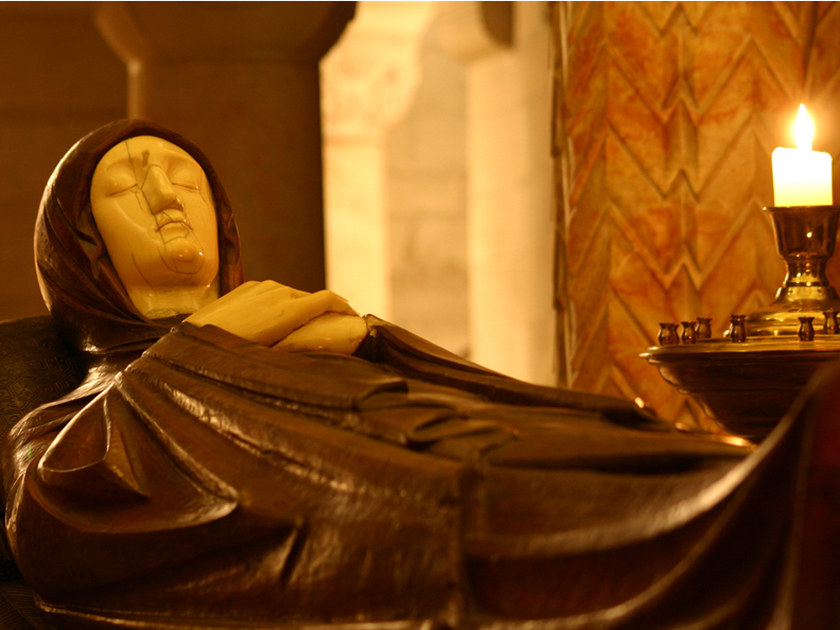“It is difficult enough believing that Jesus rose from the dead: but isn’t it demanding a bit too much to believe that Mary did it as well!?”
28. September 2015
 Marienfigur in der Krypta der Dormitio-Basilika.
Marienfigur in der Krypta der Dormitio-Basilika.
Abbot Gregory's sermon for the feast of the Assumption (15th August 2015)
Many years ago, when teaching religion in my monastery’s school in Ireland, one reflective boy remarked to me, “It is difficult enough believing that Jesus rose from the dead: but isn’t it demanding a bit too much to believe that Mary did it as well!?” It was an interesting question from an intelligent teenager. But his question invites us to reflect on what we mean by the “Assumption” of Mary and why we celebrate it today - here in Dormition Abbey, at the place where she breathed forth her soul - and in company with the Universal Church, both in East and West.
When we compare the resurrection of Jesus (recorded in Scripture) with that of Mary (recorded by Tradition) we can identify one crucially important difference. According to the New Testament, Jesus both rose from the dead by his own power and was raised from the dead by the Father and the Holy Spirit. This is because he has two natures, divine and human, united in the one divine person of the Son of God. Thanks to his own divine power we can say - in the active voice - that he rose himself from the dead; but as the incarnate Word of God made flesh, we can also say that, according to his human nature – in the passive voice - he was raised from the dead by all three divine persons, of which he is himself eternally one. It is the great mystery of the incarnation.
Therefore in his case, both statements are true – he both rose and was raised from death. But they are true only of him as the one and only mediator between God and humankind. They are not true of anyone else, including Mary. For although Christ Our Lord is truly human he is not only that - he is also more much – he is the eternal Son of God, the Word-made-flesh, the Theanthropos, the “God-man.”
In Mary’s case, the situation is different for she is an ordinary human being, just like you and me. She is not, unlike her Son, a divine person united to a human nature, nor is she some goddess from pagan mythology. No, she was a Jewish woman from Nazareth, chosen by God to carry out his will. But she fulfilled the vocation she received more fully than any other human being has ever done or ever will do. Through her unconditional consent to God’s will, the Word became flesh and redemption was accomplished. Therefore she rejoiced in God who saved her, and called her to his service.
That is why we do not talk about her “rising from the dead” as something she achieved herself, but about her being “raised by God”; nor do we speak of her ascension but of her assumption. Mary was taken up into heaven by God’s power alone, a power which was pure grace. She did not have that power by nature. It was totally and unreservedly God’s gift, given in answer to her exemplary faith – a faith itself based on the original grace given to her in her conception.
For that reason, the Catholic and Orthodox churches venerate Mary as the perfect disciple of Christ, the icon of the true believer, and the “Great Sign” of the apocalyptic Book of Revelation from which we have heard today. She points to the future of the human race: our ultimate salvation and the glorification of the body, in which we will become like Christ, our transfigured Lord.
The mystery of the Assumption is therefore closely bound up with the mystery of the Church, a people called to share in Christ’s resurrection. But that is not, as Karl Barth rightly warned, so that we may hijack the figure of the glorified Mary to project the image of a triumphalistic Church, a Church self-inflated by its own glory, a Church which too quickly forgets that it is also a sinful community on a pilgrimage through time…
On the contrary, today’s feast invites us to recognize in Mary the exact opposite. She is the supreme example of God’s saving grace. He who is mighty did great things for her and holy is his name! Mary, glorified by God for her humility and her obedience to the divine plan, is the sign of what awaits us all when we too give way to God and surrender our lives to his grace. For there is no other way to holiness than the words of Mary and her divine Son: “Not my will but yours be done!”
With her today therefore, rejoicing on this feast of her Assumption here in this place of her Dormition, let us magnify the Lord with her, proclaim his Holy Name, and exult with her in spirit, as we celebrate the God who saves us.
Amen